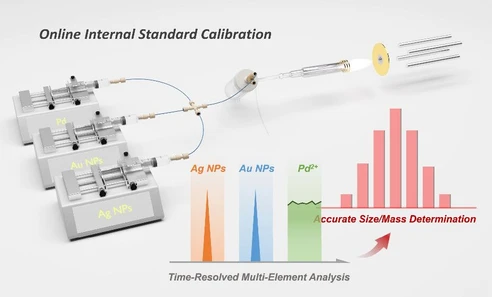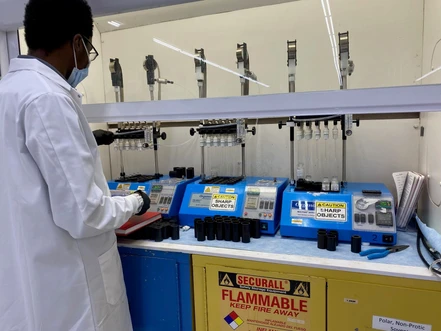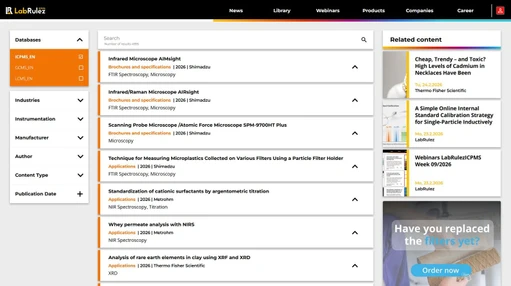Ensuring Baby Food Safety: Tackling Toxic Metals with Advanced Technology

Photo: Thermo Fisher Scientific: Ensuring Baby Food Safety: Tackling Toxic Metals with Advanced Technology
In recent years, the spotlight on the safety of baby food has intensified, driven by growing concerns about toxic heavy metals like arsenic, cadmium, lead, and mercury. These elements, even in low concentrations, pose significant health risks to infants and toddlers, whose developing bodies are particularly vulnerable. As regulatory standards tighten, advanced analytical techniques such as inductively coupled plasma mass spectrometry (ICP-MS) have emerged as crucial tools in ensuring baby food meets stringent safety and nutritional benchmarks.
The importance of monitoring heavy metals in baby food
Heavy metals can make their way into baby food through environmental contamination, agricultural practices, or industrial processes. For instance:
- Lead can leach from soil into crops.
- Arsenic is often present in rice and rice-based products due to its natural occurrence in water and soil.
- Mercury can accumulate in fish and seafood.
- Cadmium is introduced via contaminated soil or fertilizers.
Even trace amounts of these metals can lead to neurological damage, developmental delays, and other long-term health issues. Regulatory bodies like the FDA and the European Union have established maximum permissible levels for these toxic elements. For example, the Baby Food Safety Act of 2021 in the U.S. mandates maximum limits such as 10 µg/kg for inorganic arsenic and 5 µg/kg for lead in baby food products.
 Thermo Fisher Scientific: Ensuring Baby Food Safety - Tackling Toxic Metals with Advanced Technology
Thermo Fisher Scientific: Ensuring Baby Food Safety - Tackling Toxic Metals with Advanced Technology
The role of ICP-MS in baby food safety
To comply with these regulations, manufacturers require robust analytical methods that offer high sensitivity, precision, and reproducibility. ICP-MS, particularly when paired with advanced sample preparation techniques, has become the gold standard for detecting and quantifying both toxic and essential trace elements in baby food.
A streamlined workflow
A recent study showcased a comprehensive workflow using the Thermo Scientific™ iCAP™ MTX ICP-MS system:
- Sample preparation: Baby food samples, ranging from dry powders to high-fat and high-moisture items, were processed using microwave-assisted acid digestion. This method ensures uniform preparation and minimizes manual handling.
- Automated dilution: The system’s argon gas dilution (AGD) capability allowed for a consistent five-fold dilution of all samples, accommodating a wide variety of matrices without compromising detection sensitivity.
- Interference management: By leveraging triple quadrupole modes with reactive gases, the ICP-MS effectively suppressed polyatomic and isobaric interferences, ensuring accurate results even for challenging elements like arsenic and mercury.
- Quality control: Calibration curves and internal standard checks maintained accuracy throughout the analysis, with all results aligning within regulatory limits.
Key findings
The study analyzed six baby food products, including fruit purees, cereal, yogurt, and fish-based meals. While most samples adhered to safety standards, certain findings highlighted areas for further attention:
- Arsenic: Elevated levels were detected in salmon-based purees, attributed to organic arsenic compounds naturally present in fish.
- Cadmium and lead: Slightly elevated levels in carrot-based products underscore the need for rigorous soil testing and monitoring.
Benefits of advanced ICP-MS analysis
Beyond regulatory compliance, ICP-MS offers additional advantages:
- Nutritional assessment: Simultaneous analysis of essential nutrients like calcium, iron, and zinc ensures baby food supports healthy growth.
- Efficiency and productivity: The automated workflow minimizes operator intervention, making it suitable for high-throughput laboratories.
- Reliability: Consistent results across diverse sample types build confidence in food safety and quality.
Conclusion
Ensuring the safety of baby food is not just a regulatory requirement—it’s a responsibility to protect the youngest and most vulnerable members of our society. By harnessing the power of ICP-MS, manufacturers can confidently address both safety concerns and nutritional needs, delivering products that parents can trust. As technology continues to evolve, such advancements promise a future where baby food safety is guaranteed, one analysis at a time.
Explore more: Learn how the Thermo Scientific iCAP MTX ICP-MS system is setting new standards in trace metals analysis for food safety.




